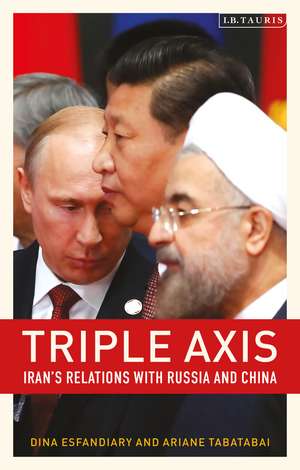Triple-Axis: Iran's Relations with Russia and China
Autor Ariane Tabatabai, Dina Esfandiaryen Limba Engleză Paperback – 16 iun 2021
Preț: 126.96 lei
Preț vechi: 137.62 lei
-8% Nou
24.29€ • 25.42$ • 20.18£
Carte disponibilă
Livrare economică 13-27 martie
Livrare express 26 februarie-04 martie pentru 33.17 lei
Specificații
ISBN-10: 0755640624
Pagini: 256
Ilustrații: 3 maps
Dimensiuni: 138 x 216 x 25 mm
Greutate: 0.3 kg
Editura: Bloomsbury Publishing
Colecția I.B.Tauris
Locul publicării:London, United Kingdom
Caracteristici
Notă biografică
Dina Esfandiary is CSSS Fellow in the War Studies Department at King's College London, UK and an Adjunct Fellow in the Middle East Program at the Center for Strategic and International Studies (CSIS) in Washington D.C, USA. Prior to joining King's College London, she was a Research Associate in the Non-Proliferation and Disarmament Programme of the International Institute for Strategic Studies (IISS) in London, which she joined from a disarmament NGO in Geneva. She was also International Security Program Research Fellow at the Harvard Kennedy School's Belfer Center for Science and International Affairs, USA. Esfandiary's work has appeared in a range of publications, including Foreign Affairs, The Atlantic, The Guardian, The Washington Post, The National Interest, International Affairs, and The Washington Quarterly. She is the co-author of Living on the Edge: Iran and the Practice of Nuclear Hedging (2016).Ariane Tabatabai is Director of Curriculum and Visiting Assistant Professor of Security Studies at the Georgetown University Edmund A. Walsh School of Foreign Service, USA. She is also Adjunct Senior Fellow with the Middle East Security Program at the Center for a New American Security in Washington D.C, USA. Previously she was Research Fellow in the International Security Program at the Harvard Kennedy School's Belfer Center for Science and International Affairs, USA and an International Civilian Consultant for NATO. Tabatabai's work has appeared in a range of scholarly publications, including International Security and The Journal of Strategic Studies, as well as in general-interest publications such as The New York Times, The Financial Times, and Foreign Affairs.
Cuprins
IntroductionRevisionist powers in a post-American worldEconomic tiesForeign policyDefenseProspects for future cooperation in a post-nuclear deal worldConclusion
Recenzii
Descriere
The most significant challenge to the post-Cold War international order is the growing power of ambitious states opposed to the West. Iran, Russia and China each view the global structure through the prism of historical experience. Rejecting the universality of Western liberal values, these states and their governments each consider the relative decline of Western economic hegemony as an opportunity. Yet cooperation between them remains fragmentary. The end of Western sanctions and the Iranian nuclear deal; the Syrian conflict; new institutions in Central and East Asia: in all these areas and beyond, the potential for unity or divergence is striking. In this comprehensive study, Ariane Tabatabai and Dina Esfandiary address the substance of this `triple axis' in the realms of energy, trade, and military security. In particular they scrutinise Iran-Russia and the often overlooked field of Iran-China relations. Their argument - that interactions between the three will shape the world stage for decades to come - will be of interest to anyone looking to understand the contemporary international security puzzle.
